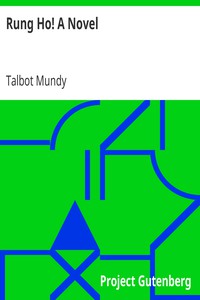Rung Ho! A Novel, Talbot Mundy [free ebook reader for ipad .txt] 📗

- Author: Talbot Mundy
Book online «Rung Ho! A Novel, Talbot Mundy [free ebook reader for ipad .txt] 📗». Author Talbot Mundy
Two of them were shut tight, and he could not kick them open; the dried-out teak and the heavy iron bolts held as though they had been built to resist a siege; the noise that he made as he rattled at them frightened a swarm of unseen things—unguessed-at shapes—that scurried away. He thought he could see beady little eyes that looked and disappeared and circled round and stopped to look again. He could hear creepy movements in the stillness. It seemed better to leave those doors alone.
One other door, which faced that of his own room, was open wide, and he could feel the forest through it; there was nothing to be seen, but the stillness moved. The velvet blackness was deeper by a shade, and the heat, uprising to get even with the sky, bore up a stench with it. There was no draught, no movement except upward. Earth was panting-in time, it seemed, to the hellish thunder of the tom-toms.
He went back and lay on the bed again, leaning the rifle against the cot-frame, and trying by sheer will-power to prevent the blood from bursting his veins. He realized before long that he was parched with thirst, and reached out for the water-jar that stood beside the lamp; but as he started to drink he realized that a crawling evil was swimming round and round in rings in the water. In a fit of horror he threw the thing away and smashed it into a dozen fragments in a corner. He saw a dozen rats, at least, scamper to drink before the water could evaporate or filter through the floor; and when they were gone there was no half-drowned crawling thing either. They had eaten it.
He clutched his rifle to him. The barrel was hot, but the feel of it gave him a sense of companionship. And then, as he lay back on the bed again, the lamp went out. He groped for it and shook it. There was no oil.
Now, what had been hot horror turned to fear that passed all understanding—to the hate that does not reason—to the cold sweat breaking on the roasted skin. Where the four walls had been there was blackness of immeasurable space. He could hear the thousand-footed cannibals of night creep nearer—driven in toward him by the dinning of the tom-toms. He felt that his bed was up above a scrambling swarm of black-legged things that fought.
He had no idea how long he lay stock-still, for fear of calling attention to himself, and hated his servant and Mahommed Gunga and all India. Once—twice—he thought he heard another sound, almost like the footfall of a man on the veranda near him. Once he thought that a man breathed within ten paces of him, and for a moment there was a distinct sensation of not being alone. He hoped it was true; he could deal with an assassin. That would be something tangible to hate and hit. Manhood came to his assistance—the spirit of the soldier that will bow to nothing that has shape; but it died away again as the creeping silence once more shut down on him.
And then the thunder of the tom-toms ceased. Then even the venomed crawlers that he knew were near him faded into nothing that really mattered, compared to the greater, stealthy horror that he knew was coming, born of the shuddersome, shut silence that ensued. There was neither air nor view—no sense of time or space—nothing but the coal-black pit of terror yawning—cold sweat in the heat, and a footfall—an undoubted footfall—followed by another one, too heavy for a man's.
Where heavy feet were there was something tangible. His veins tingled and the cold sweat dried. Excitement began to reawaken all his soldier senses, and the wish to challenge seized him—the soldierly intent to warn the unaware, which is the actual opposite of cowardice.
“Halt! Who comes there?”
He lipped the words, but his dry throat would not voice them. Before he could clear his throat or wet his lips his eye caught something lighter than the night—two things—ten—twelve paces off—two things that glowed or sheened as though there were light inside them—too big and too far apart to be owl's eyes, but singularly like them. They moved, a little sideways and toward him; and again he heard the heavy, stealthy footfall.
They stayed still then for what may have been a minute, and another sense—smell—warned him and stirred up the man in him. He had never smelled it in his life; it must have been instinct that assured him of an enemy behind the strange, unpleasant, rather musky reek that filled the room. His right hand brought the rifle to his shoulder without sound, and almost without conscious effort on his part.
He forgot the heat now and the silence and discomfort. He lay still on his side, squinting down the rifle barrel at a spot he judged was midway between a pair of eyes that glowed, and wondering where his foresight might be. It struck him all at once that it was quite impossible to see the foresight—that he must actually touch what he would hit if he would be at all sure of hitting it. He remembered, too, in that instant—as a born soldier does remember things—that in the dark an attacking enemy is probably more frightened than his foe. His father had told it him when he was a little lad afraid of bogies; he in turn had told it to the other boys at school, and they had passed it on until in that school it had become rule number one of school-boy lore—just as rule number two in all schools where the sons of soldiers go is “Take the fight to him.”
He leaped from the bed, with his rifle out in front of him—white-nightshirted and unexpected—sudden enough to scare the wits out of anything that had them. He was met by a snarl. The two eyes narrowed, and then blazed. They lowered, as though their owner gathered up his weight to spring. He fired between them. The flash and the smoke blinded him; the burst of the discharge within four echoing walls deadened his cars, and he was aware of nothing but a voice beside him that said quietly: “Well done, bahadur! Thou art thy father's son!”
He dropped his rifle butt to the floor, and some one struck a light. Even then it was thirty seconds before his strained eyes grew accustomed to the flare and he could see the tiger at his feet, less than a yard away—dead, bleeding, wide-eyed, obviously taken by surprise and shot as he prepared to spring. Beside him, within a yard, Mahommed Gunga stood, with a drawn sabre in his right hand and a pistol in his left, and there were three other men standing like statues by the walls.
“How long have you been here?” demanded Cunningham.
“A half-hour, sahib.”
“Why?”
“In case of need, sahib. That tiger killed a woman yesterday at dawn and was driven off his kill; he was not likely to be an easy mark for an untried hunter.”
“Why did you enter without knocking?”
The ex-risaldar said nothing.
“I see that you have shoes on.”





Comments (0)